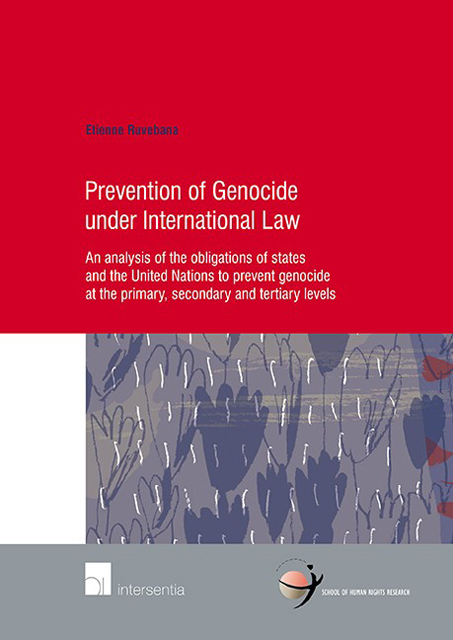 Prevention of Genocide Under International Law
Prevention of Genocide Under International Law Published online by Cambridge University Press: 24 November 2022
“There can be no more important issue and no more binding obligation than the prevention of genocide”,
Indeed, this may be considered one of the original purposes of the United Nations. The “Untold Sorrow” which the scourge of war had brought to mankind, at the time when the organization was established, included genocide on a horrific scale. The words “Never again” were on everyone's lips,”
KofiAnnanINTRODUCTION
The three previous chapters mainly discussed the obligation to prevent genocide in international law with a specific focus on what states are obligated to do in preventing genocide. Because of the nature of this obligation and the actions needed at different levels of prevention as well as the challenges involved, the need to see the role of the United Nations in the prevention of genocide became pressing at several occasions. This is also because the UN has been mentioned in the Genocide Convention. Indeed, while article I of the Genocide Convention provides for the obligation vis-à-vis contracting parties to prevent and punish genocide, article VIII provides for recourse to the UN for preventive actions. This article states that “Any Contracting Party may call upon the competent organs of the United Nations to take such action under the Charter of the United Nations as they consider appropriate for the prevention and suppression of acts of genocide or any of the other acts enumerated in article III”.
An analysis of the language used in these two articles read in the context of the Genocide Convention as a whole as well as other related sources of international law is very essential in order to know whether the United Nations has an obligation to prevent genocide and in the affirmative to know the actions it should take in complying with that obligation. Other questions linked to this need to be answered as well. The first is whether the obligation to prevent genocide by the UN (if any) is subjected to prior information by contracting states about the risk, imminence or occurrence of genocide. The second is related to the territorial scope of that obligation (if any). The third is related to the organs of the UN which are competent to take action to prevent genocide at each level and the actions they may and should take.
To save this book to your Kindle, first ensure [email protected] is added to your Approved Personal Document E-mail List under your Personal Document Settings on the Manage Your Content and Devices page of your Amazon account. Then enter the ‘name’ part of your Kindle email address below. Find out more about saving to your Kindle.
Note you can select to save to either the @free.kindle.com or @kindle.com variations. ‘@free.kindle.com’ emails are free but can only be saved to your device when it is connected to wi-fi. ‘@kindle.com’ emails can be delivered even when you are not connected to wi-fi, but note that service fees apply.
Find out more about the Kindle Personal Document Service.
To save content items to your account, please confirm that you agree to abide by our usage policies. If this is the first time you use this feature, you will be asked to authorise Cambridge Core to connect with your account. Find out more about saving content to Dropbox.
To save content items to your account, please confirm that you agree to abide by our usage policies. If this is the first time you use this feature, you will be asked to authorise Cambridge Core to connect with your account. Find out more about saving content to Google Drive.